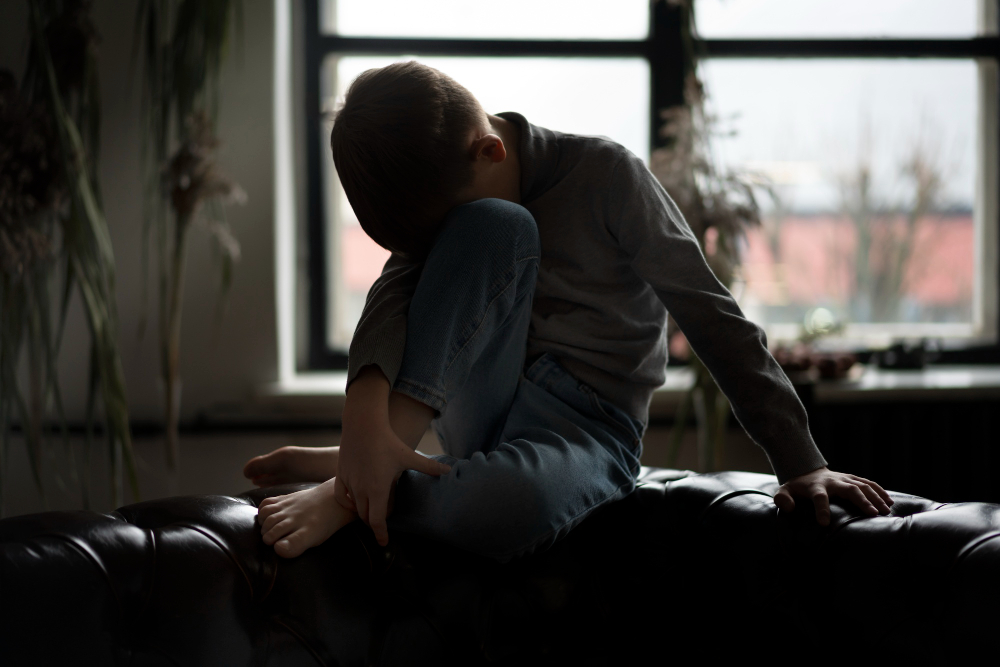Understanding Reactive Attachment Disorder
Reactive Attachment Disorder (RAD) is a complex condition that arises when a child is unable to establish healthy attachment with their parent or primary caretaker. This inability to form secure and nurturing relationships can have profound effects on the child’s emotional and psychological development. If left untreated, RAD can persist into adulthood and have significant impacts on the individual’s life.
Definition and Overview
RAD is characterized by a child’s difficulty in forming and maintaining emotional bonds with others, including their primary caregivers. This condition typically develops as a result of early neglect or a lack of consistent and responsive care during the critical developmental period. Without the necessary experiences of comfort, affection, and nurturing, the child’s ability to establish secure attachments is hindered.
Children with RAD often exhibit a range of behavioral and emotional challenges. They may struggle with trust, have difficulty expressing or receiving affection, and exhibit developmental delays. These manifestations can vary from mild to severe, depending on the individual case.
Effects of Untreated RAD
If left untreated, RAD can have far-reaching consequences in adulthood. The impact of early neglect and disrupted attachment can lead to significant difficulties in forming and maintaining healthy relationships. Individuals with untreated RAD may struggle with trust issues, have difficulty connecting with others on an emotional level, and experience challenges in intimate relationships. These difficulties can extend beyond romantic relationships to friendships, family connections, and professional interactions.
Furthermore, untreated RAD can also have implications for mental health. Individuals with RAD may be at a higher risk of developing other psychological disorders, such as post-traumatic stress disorder and complex PTSD. The emotional and psychological impact of early neglect can contribute to difficulties in regulating emotions, coping with stress, and maintaining overall well-being.
It is important to note that early intervention is key in addressing RAD. With appropriate therapeutic interventions and support, most children with RAD can develop healthier relationships and improve their overall functioning. For more information on treatment options, please refer to the section on Treatment Options for Reactive Attachment Disorder.
Understanding and recognizing the signs of reactive attachment disorder is crucial for early intervention and providing the necessary support for affected individuals. By addressing RAD in its early stages, there is a greater opportunity for positive outcomes and the development of healthy relationships.
Symptoms of Reactive Attachment Disorder
Reactive Attachment Disorder (RAD) is a complex disorder that affects a child’s ability to form healthy attachments and relationships. Recognizing the symptoms of RAD is crucial for early identification and intervention. The symptoms of RAD can be categorized into two main areas: behavioral indicators and emotional manifestations.
Behavioral Indicators
Children with RAD may exhibit the following behavioral indicators:
- Avoidance of physical contact: Children with RAD may actively avoid or resist physical affection, such as hugs or cuddling. They may display a lack of responsiveness to attempts at comfort from caregivers or others.
- Minimal or absent seeking of comfort: Children with RAD may not actively seek comfort or support from their caregivers. They may not reach out for help when distressed or hurt.
- Withdrawal or social isolation: Children with RAD may prefer to be alone and may avoid social interactions. They may isolate themselves from others, even in situations where interaction is expected or desired.
- Indiscriminate affection: For some children with RAD, there may be a paradoxical display of indiscriminate affection towards strangers. This can manifest as overly friendly behavior, seeking affection from unfamiliar individuals, or acting younger than their age.
Emotional Manifestations
Emotional manifestations of RAD can include:
- Limited or absent positive emotions: Children with RAD may exhibit a reduced range of positive emotions, such as joy or happiness. They may have difficulty expressing or experiencing positive emotions in response to positive stimuli or interactions.
- Anger and irritability: Children with RAD may display frequent or intense anger and irritability. They may have difficulty regulating their emotions and may react with aggression or tantrums.
- Sadness or depression: Some children with RAD may exhibit signs of sadness or depression. They may appear consistently sad or have a persistent low mood.
- Anxiety and hypervigilance: Children with RAD may be constantly on edge or exhibit excessive worry or anxiety. They may be hypervigilant to potential threats or changes in their environment.
Recognizing these symptoms is crucial for early intervention and support. If you suspect that a child may be experiencing RAD, it is important to seek professional help for an accurate diagnosis and appropriate treatment. Treatment options for RAD often involve therapy approaches that address attachment difficulties and provide support for both the child and their primary caregivers. Early intervention is key in improving outcomes and helping children with RAD develop healthy relationships.
Understanding the behavioral indicators and emotional manifestations of RAD can help caregivers, educators, and healthcare professionals provide the necessary support and interventions for children with this challenging disorder.
Impact of Reactive Attachment Disorder in Adulthood
Reactive Attachment Disorder (RAD) can have profound and long-lasting effects on individuals as they transition into adulthood. The disorder can significantly impact various aspects of their lives, including relationships and mental health.
Relationship Challenges
Adults with RAD may experience difficulties in forming and maintaining healthy relationships. Dysfunctional thoughts, feelings, and behaviors associated with RAD can hinder their ability to fully engage in relationships and develop a positive sense of self. This can affect both personal and professional growth, as the individual may struggle with trust, emotional connection, and intimacy.
These challenges in forming and maintaining relationships can extend to all areas of life, including professional, platonic, and romantic relationships. The compromised ability to experience relationships and lack of positive self-perception can contribute to compromised mental health [3].
Mental Health Implications
Reactive Attachment Disorder in adulthood can also have significant implications for mental health. The struggles in forming and maintaining relationships, along with the emotional and behavioral consequences of RAD, can lead to compromised mental well-being.
Adults with RAD may be more prone to developing other mental health conditions, such as depression, anxiety disorders, and substance use disorders. The impact of RAD can be far-reaching, potentially leading individuals to self-medicate with drugs and alcohol as a way to cope with their emotional challenges. This can further exacerbate their struggles and create additional turmoil in their lives.
It is essential for individuals with RAD to seek appropriate treatment and support to address the impact of the disorder on their relationships and mental health. With proper interventions and therapy, individuals can learn coping strategies, develop healthier relationship patterns, and improve their overall well-being.
Reactive Attachment Disorder in adulthood is a complex condition that requires a comprehensive and individualized approach to treatment. Early intervention is crucial in preventing the persistent consequences of RAD and promoting healthier outcomes [4]. By addressing the challenges associated with RAD and providing the necessary support, individuals can work towards building fulfilling and meaningful lives.
Get your question answered now.
Treatment Options for Reactive Attachment Disorder
When it comes to treating reactive attachment disorder (RAD), early intervention is key to improving outcomes for children. If you notice any symptoms of RAD or your child has difficulty developing normal relationships, it is important to contact your child’s healthcare provider for evaluation and diagnosis. Treatment for RAD typically involves a combination of therapies and support strategies that focus on helping the child develop secure attachments and improve their social and emotional abilities.
Therapy Approaches
Therapy plays a crucial role in the treatment of reactive attachment disorder. Existing treatments for RAD tend to be attachment-based therapies, which aim to help the child develop and maintain healthy attachments with their caregivers. While there is no standard treatment for RAD, therapy approaches that have shown promise include:
- Behavior Management Training (BMT): BMT has been found to be effective in reducing problematic behaviors in children with RAD, such as defiance, aggression, and problems with attention and concentration. This therapy focuses on teaching caregivers strategies to manage and modify the child’s behavior. BMT has been associated with lower premature termination rates among caregivers and has not been documented to cause harm to children participating in the treatment.
- Attachment-Based Therapy: This type of therapy aims to enhance the attachment bond between the child and their primary caregivers. It focuses on creating a secure and nurturing environment for the child, allowing them to develop trust, emotional regulation, and healthy social connections. Attachment-based therapy typically involves both the child and the parents or primary caregivers to ensure a comprehensive approach to treatment.
It is important to note that some therapies, such as holding therapy, have been publicized in the past but lack empirical support. Many mental health professionals and professional societies caution against their use due to potential risks, such as physical injury and perpetuation of trauma. Therefore, it is essential to consult with qualified professionals who can guide you towards evidence-based treatments.
Importance of Early Intervention
Early diagnosis and intervention are crucial for children with reactive attachment disorder. Research suggests that most children, even those who have experienced neglect, have the capacity to develop healthy relationships with appropriate support and intervention. By addressing RAD in its early stages, the chances of positive outcomes and improved social and emotional abilities increase significantly.
The involvement of parents or primary caregivers in the treatment process is essential. These individuals play a vital role in creating a secure and nurturing environment for the child, facilitating the development of healthy attachments. Support strategies, such as providing consistent care, creating routines, and using positive reinforcement, can contribute to the child’s progress [2].
In conclusion, therapy approaches that focus on attachment and behavior management, along with the involvement of parents or primary caregivers, are key components of treating reactive attachment disorder. Early intervention is crucial for improving outcomes and helping children with RAD develop secure attachments and enhance their social and emotional abilities. By seeking appropriate professional guidance and support, you can provide your child with the necessary tools to navigate the challenges associated with RAD.
The Role of Caregivers
When it comes to supporting individuals with reactive attachment disorder (RAD), the role of caregivers is crucial in promoting healing and growth. Caregivers play a significant role in providing a safe and nurturing environment for children with RAD, helping them develop healthy attachments and navigate the challenges they may face. Here, we will explore some support strategies and discuss coping with emotional challenges.
Support Strategies
Caregivers of children with reactive attachment disorder may experience a range of complex emotions, including anger, frustration, guilt, and distress. It is not uncommon for caregivers to feel like the child does not love them or find it challenging to connect with the child at times. To effectively support children with RAD, caregivers can employ the following strategies:
- Education and Understanding: Seek knowledge about reactive attachment disorder to better understand the condition and its impact. This can help caregivers develop empathy and tailor their approach to meet the specific needs of the child.
- Consistency and Predictability: Establish consistent routines and clear boundaries to provide stability and predictability for the child. This helps create a sense of safety and security, which is essential for individuals with RAD.
- Positive Reinforcement: Use positive reinforcement techniques to encourage appropriate behavior and reinforce healthy attachments. Praising and rewarding positive interactions and efforts can help build trust and strengthen the caregiver-child bond.
- Therapeutic Interventions: Collaborate with mental health professionals specializing in reactive attachment disorder. Therapeutic interventions, such as attachment-focused therapy or play therapy, can provide additional support and guidance for both the child and the caregiver.
Coping with Emotional Challenges
Caring for a child with reactive attachment disorder can be emotionally challenging for caregivers. It is important for caregivers to prioritize their own well-being and develop strategies to cope with these emotions. Here are some coping mechanisms that caregivers can utilize:
- Self-Care: Make self-care a priority. Engage in activities that promote relaxation, reduce stress, and provide personal fulfillment. This may include exercise, hobbies, spending time with supportive friends and family, or seeking professional counseling or support groups.
- Seeking Support: Connect with other caregivers who are navigating similar challenges. Support groups or online communities can provide a safe space to share experiences, learn from others, and receive emotional support.
- Managing Expectations: Understand that progress may take time, and setbacks are a normal part of the journey. Be patient with both the child and yourself, and celebrate small victories along the way.
- Open Communication: Maintain open and honest communication with the child’s treatment team. Regularly discuss concerns, seek guidance, and collaborate on strategies to support the child’s development and well-being.
By implementing support strategies and developing effective coping mechanisms, caregivers can create a nurturing and healing environment for children with reactive attachment disorder. Remember, seeking professional help and building a network of support are essential components of the caregiving journey. Together, caregivers and professionals can make a positive difference in the lives of those affected by RAD.
Neurological Effects of Neglect
Neglect during early development can have profound effects on a child’s brain, leading to long-term consequences for their neurological development and overall behavior. In this section, we will explore the brain development impacts and behavioral consequences associated with neglect.
Brain Development Impacts
Neglect can affect the brain development of children even before birth. High levels of stress hormones during pregnancy, caused by neglect, can lead to reduced brain size and impaired development in children. In infancy and early childhood, neglect significantly impacts the brain by impeding the formation of neurological pathways essential to communication. This harm is particularly evident in the frontal cortex, which is responsible for functions such as planning, decision-making, and memory. Extreme neglect can even lead to smaller brain sizes in children.
The lack of nurturing and responsive caregiving experienced by neglected children deprives them of crucial stimulation necessary for healthy brain development. This deprivation can hinder the growth of neural connections, limiting their cognitive abilities and overall learning potential.
Behavioral Consequences
Neglect has far-reaching behavioral consequences for children. Up to 85% of children in out-of-home placement experience some disruption in attachment, with attachment difficulties caused by neglect affecting every aspect of their development, especially their ability to relate to others. Children who have experienced neglect often face challenges in coping, managing emotions, and developing a positive self-concept.
Neglected children may develop an expectation of not receiving care and warmth from others, leading to a lack of motivation and task-oriented behavior. They may also have a diminished sense of self-efficacy and expect not to be successful in tasks, which can impact their overall development.
The impact of neglect on behavior extends beyond childhood. Adults who experienced neglect in their early years may struggle with relationship challenges, finding it difficult to form and maintain healthy connections with others. Neglect can also contribute to mental health implications, such as an increased risk of developing post-traumatic stress disorder (PTSD) and complex PTSD [6].
Given the significant impacts of neglect on brain development and behavior, early intervention is crucial. Understanding the factors contributing to neglect and developing strategies to identify and address neglect in its early stages can help mitigate these effects. By providing nurturing and responsive care, appropriate therapy, and support, we can promote healthy brain development and improve the long-term outcomes for children who have experienced neglect.
Resources
- [1]: https://my.clevelandclinic.org/health/diseases/reactive-attachment-disorder
- [2]: https://www.mayoclinic.org/diseases-conditions/reactive-attachment-disorder/diagnosis-treatment/drc
- [3]: https://discoverymood.com/blog/reactive-attachment-disorder-in-adulthood/
- [4]: https://www.mayoclinic.org/diseases-conditions/reactive-attachment-disorder/symptoms-causes/syc
- [5]: https://www.ncbi.nlm.nih.gov/pmc/articles/PMC2566997/
- [6]: https://practicenotes.org/v18n1/impact.htm
Did You Know? According to WHO, one out of every seven teens is struggling with some sort of mental illness.










